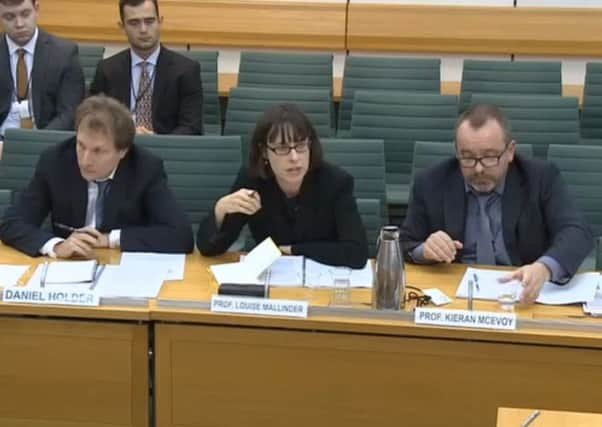Ben Lowry: The UUP is far from alone in its opposition to the legacy scandal


Prof McEvoy is, obviously, entitled to his view but his remarks, in an appearance before the Northern Ireland Affairs Committee (NIAC) alongside two academics, placed him on one side of the political debate as to how to tackle legacy.
An implication of his comment is that the UUP is isolated in its opposition. Among the five big parties it seems to be so, but in the wider community the party is not alone.
Advertisement
Hide AdAdvertisement
Hide AdThis time last year this newspaper began a Stop The Legacy Scandal series. It sought, via essays, to reflect concerns of a range of voices that the approach to legacy is one sided against security forces, to the advantage of terrorists.
Even many supporters of SHA acknowledge a legacy imbalance, but then claim that the proposed new legacy bodies will rectify it.
Such logic is cited to justify pushing through SHA structures, yet there are people (some of whom wrote for our series) who think those bodies compound the bias.
The UUP leader Robin Swann MLA was among our essay contributors. But so were the top ex RUC men Norman Baxter, Alan McQuillan, Chris Albiston; the ex military General Julian Thompson, Lord Dannatt, Colonel Tim Collins; the human rights pioneer Jeff Dudgeon; the lawyers Neil Faris, Austen Morgan; academics Professor Liam Kennedy, Prof Henry Patterson, Prof Arthur Aughey, Dr Cillian McGrattan; the churchmen Canon Ian Ellis, Rev Alan Irwin; the commentators Kevin Myers, Ruth Dudley Edwards; victims including Jackie Nicholl (whose infant son was murdered in an IRA bomb yet found he had been on the victims forum beside an IRA bomber), Anthony O’Reilly (sister murdered in a loyalist bomb), Anne Graham (sister of Edgar); the ex paramilitaries Shane Paul O’Doherty and Padraig Yeates.
Advertisement
Hide AdAdvertisement
Hide AdThere were many other contributors, whose essays appeared over several months. Contributors were free to write what they wanted, with one proviso: that they accepted the premise of the series, which was that the system was so unbalanced as to constitute a scandal.
Plenty of influential people in society would not accept that premise, but their voices are often heard and we were giving a platform to a neglected view.
The proposed SHA structures are complicated, and many of the contributors to our series did not examine them, rather recounting their experience of current injustices. Of those who did look at SHA, their assessment was unflattering.
The web version of this article has a link to all essays (see below). They are compelling, so it is hard to pinpoint any of them, but see what Mr Faris, Mr Dudgeon and Dr McGrattan have to say about SHA.
Advertisement
Hide AdAdvertisement
Hide AdOur series was a major body of evidence that revealed grave misgivings among a diverse group of people who deserve to be listened to about their belief of a subtly pro terror direction of travel on legacy.
Yet the series was largely ignored — no other media outlet picked up on a scrap of it. OK, media outlets are rivalrous, but, while there are many stories about soldier trials, no outfit has given sustained scrutiny to the notion that legacy is heading in one direction.
Since our series I have listened to broadcast discussions in which each contributor was pro SHA.
At this week’s NIAC, the three academics faced a few hard questions. Kate Hoey asked about a perception that the Committee for the Administration of Justice (CAJ), with which the trio are linked, was anti state. Prof McEvoy dismissed that.
Advertisement
Hide AdAdvertisement
Hide AdBut they faced easy questions too and various potential problems with SHA went unexamined.
This will not be rectified by the NIAC listening to a delegation of people who put forward a counter view on SHA to that given by the academics. It would need input from all categories of concerned people.
I would go further. If the UK hadn’t long ago capitulated to a narrative that state and terrorist are equally culpable for the past, it would have set up a probe into how we ever got into a situation in which soldiers are being prosecuted for single killings but no IRA leaders face trial for their decades of crime.
Into how only state is being judged in inquiries to a sub criminal standard (where it is easier to find against) and how, incredibly, that has been allowed to continue under SHA via legacy inquests and police misconduct investigations.
• Ben Lowry (@BenLowry2) is News Letter deputy editor